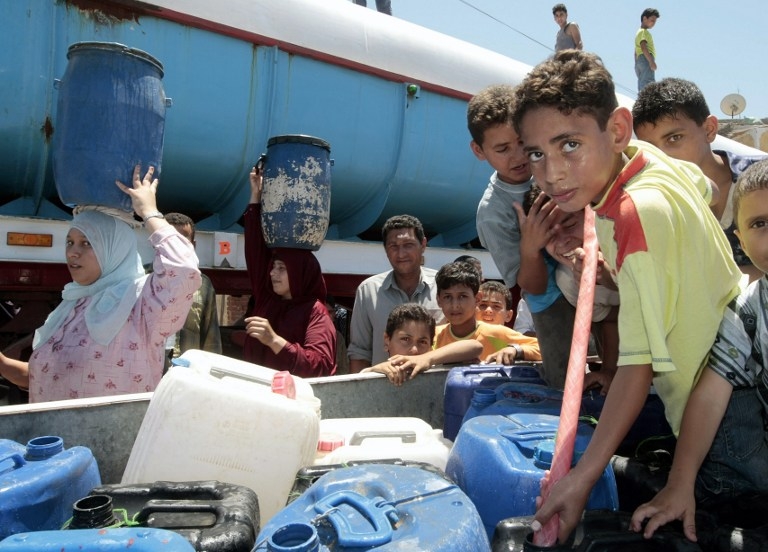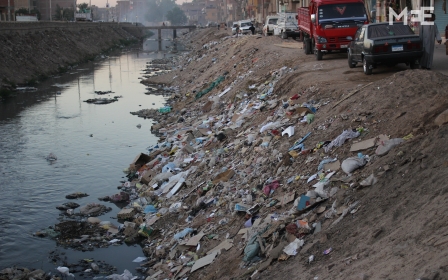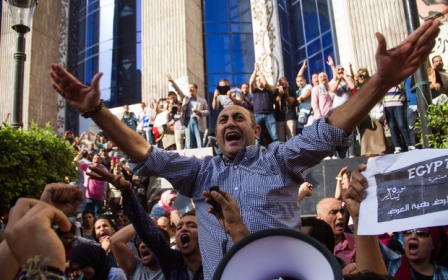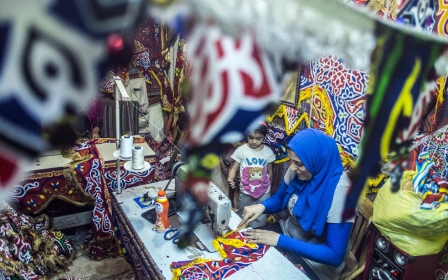'Our children will die of thirst': Egypt simmers as water shortages fuel protests

Drinking water shortages have left parts of Egypt going thirsty for up to two weeks in the run-up to Ramadan, with popular frustration over the failure of authorities to tackle the crisis spilling onto the streets.
The shortages have not only left many Egyptians unable to quench their thirst after fasting in scorching heat, but also their ability to perform ablutions - ritual washing before prayers - during Islam’s holiest month.
For some areas in the country’s south, the shortages last for days and are more likely to strike poorer areas with stronger severity, a resident told Middle East Eye.
The water shortages have exacerbated an already difficult Ramadan in Egypt which saw food prices increase by 12.7 percent in April compared to the same month last year, according to statistics from Egypt’s Central Bank. The cost of rice, an Egyptian staple, has more than doubled compared to last year’s Ramadan.
Falling tourism revenues have sparked a currency crisis that has pushed up the cost of living, which is a further blow to the country’s most vulnerable, especially following government closures of Muslim Brotherhood and other Islamist-affiliated charitable organisations which have traditionally assisted them.
Boiling point
In recent days, residents of Egypt’s impoverished south have begun an escalating campaign of cutting off roads and highways to draw attention to their plight, according to a report in pan-Arab newspaper al-Araby al-Jadeed.
Amir Mamdouh, a lawyer and resident in the southern city of Aswan, told MEE on Monday that “the water cuts have become normal,” but that he had noticed a definite increase from the start of Ramadan.
He also noted that the severity of the cuts depended on where you live. More prosperous areas populated by businessmen and military and police officers suffered cuts of only half an hour each day, he told MEE.
“In the poorer areas there is no water for four or five hours,” he said.
“In Kom Ombo, Aswan, sometimes there is no water for days.”
Eman, another Aswan resident who declined to use her last name for fear of government retribution, told MEE that the motors that power home water supplies often do not switch off during the cuts, meaning people are charged for using water that they have not used, adding more frustration.
Last Saturday, a group of people from eight villages in the northern al-Dakahlia governorate demonstrated outside the governor’s office in a rare display of public protest, according to Egyptian daily al-Masry al-Youm.
“Our children are going to die from thirst, but the government does not care,” one protester told al-Masry al-Youm.
Their water supply, which had suffered shortages over the previous eight summers, had reportedly been cut off entirely for 15 days ahead of the demonstration.
Consistent promises by local authorities to improve water infrastructure in the region have been left unfulfilled, they said.
“We have complained to all those responsible but to no avail, and all the head of the water company told us was that he did not have a solution for us except the water tankers,” one of the protesters told al-Masry al-Youm.
“But unfortunately, the water tankers do not come regularly and if it comes people fight with each other, and I am afraid people will kill each other for a jerry can of water.”
Over the weekend, Egyptian media reported that armed men in the restive Sinai Peninsula seized a government-owned water tanker in the provincial capital of North Sinai province, al-Arish.
In areas of the southwestern governorate of al-Wady al-Gedeed, protesters forcibly shut down local water valves and illegally tapped into the drinking water supply themselves.
Government ministers have been keen to deflect blame, with Egyptian Minister of Water Resources and Irrigation Mohamed Abdel Ati blaming the drought in the Nile Basin region for the water shortages.
The protests and outcry have put pressure on regional governors. Luxor Governor Mohammed Badr announced over the weekend that he had earmarked more than $281,000 to fix and extend drinking water pipelines.
Infrastructure woes
Egypt has a track record of poor water infrastructure. The Aswan High Dam, which opened in 1970, is notoriously inefficient. The open canals are used to irrigate crops, for example, which means that up to three billion cubic metres of water – or the equivalent of 1.2 million Olympic-size swimming pools – is lost each year through evaporation.
For this reason, water crises are nothing new to Egypt. It has already fallen below the United Nations’ water poverty threshold, with per capita water availability decreasing by more than 60 percent over the past 40 years according to Egypt’s official statistics agency, CAPMAS.
The UN predicts that Egypt could become officially water scarce as early as 2025. Though lack of drinking water is the spark behind the current protests, over 80 percent of Egypt’s water is actually used in the agricultural sector to feed its booming population, which is expected to reach 116 million by 2030 according to some estimates.
The crisis comes in the midst of ongoing controversy over Ethiopia’s Renaissance Dam, which, if completed, would be the largest hydroelectric power plant in Africa. Ethiopia insists the project will not harm Egyptian or Sudanese interests, but Egyptian authorities are still concerned the project will decrease their share of Nile river water.
By late May, the dam was already halfway towards completion.
But dam and agricultural use aside, back in the streets of Cairo, in the central governorate of Giza, some residents put the blame directly on the government.
“How can [Egyptian President] Sisi tell us ‘Long live Egypt’ when we are going to die of thirst?” Mohammed el-Sayed, a local resident, told the Masr al-Arabiya website, referring to Sisi’s campaign slogan. “Are we not also from this country?”
This article is available in French on Middle East Eye French edition.
New MEE newsletter: Jerusalem Dispatch
Sign up to get the latest insights and analysis on Israel-Palestine, alongside Turkey Unpacked and other MEE newsletters
Middle East Eye delivers independent and unrivalled coverage and analysis of the Middle East, North Africa and beyond. To learn more about republishing this content and the associated fees, please fill out this form. More about MEE can be found here.




